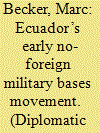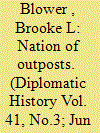| Srl | Item |
| 1 |
ID:
153038


|
|
|
|
|
| Summary/Abstract |
Peace activists from around the world gathered in Ecuador in 2007 for the International Conference for the Abolition of Foreign Military Bases and demanded the closure of existing foreign bases, a cleanup of environmental contamination, and an end to legal immunity for foreign military personnel. They called for support for and solidarity with “those who struggle for the abolition of all foreign military bases worldwide.”1 The conference came immediately after Rafael Correa, riding a rising tide of anti-imperialist sentiment, assumed office. The leftist president highlighted the United States’ hypocrisy when he famously quipped that he would allow the United States to maintain its military presence in Ecuador if in exchange the United States would permit his country to establish a base in Miami. Correa refused to renew a ten-year lease on the military base at Manta. When the U.S. lease expired two years later, U.S. troops peacefully departed.
|
|
|
|
|
|
|
|
|
|
|
|
|
|
|
|
| 2 |
ID:
153041


|
|
|
|
|
| Summary/Abstract |
Dwight Eisenhower did not ignore the call for African independence because of the Soviet threat. Instead cultural assistance—education and information—were employed to foster self-government. This commitment to cultural assistance explains why aid to African countries in real numbers remained low: economic assistance had to include educational schemes to be effective.
|
|
|
|
|
|
|
|
|
|
|
|
|
|
|
|
| 3 |
ID:
153036


|
|
|
|
|
| Summary/Abstract |
Masculinizing Japan and Reorienting San Francisco” brings the resources of urban history to the study of the United States in the world, in order to examine a local incarnation of the Cold War public-diplomacy program of sister cities. A cohort of San Francisco businessmen with interests in Asia crafted a city affiliation with Osaka in order to solidify business networks with Japan’s booming economy. The affiliation’s transpacific connections and cultural, popular programs were uniquely capable of reshaping and broadcasting images complementary to the businessmen’s goals for both official and popular audiences. Private events and public festivities portrayed Japan as a mature, capable, and equal partner in contrast to contemporary feminized and childlike portrayals or recent demonized ones. Similarly, San Francisco itself was shown as having celebrated and extensive ties to Japan in contrast to the city’s long-established Chinese connections and history of anti-Japanese activism. These new images allowed both Japanese and San Franciscans to imagine and support increased transpacific commerce while elevating San Francisco’s position in the Pacific world.
|
|
|
|
|
|
|
|
|
|
|
|
|
|
|
|
| 4 |
ID:
153037


|
|
|
|
|
| Summary/Abstract |
This article charts U.S.-Japan relations during the John F. Kennedy administration, particularly efforts to repair the U.S.-Japan alliance following massive protests in Japan against the U.S.-Japan Security Treaty. Challenging previous scholarship that minimized these efforts, I describe a fundamental reformulation of U.S.-Japan relations that continues to adhere today.
|
|
|
|
|
|
|
|
|
|
|
|
|
|
|
|
| 5 |
ID:
153035


|
|
|
|
|
| Summary/Abstract |
Situating post-1945 military bases in their deeper history, this essay argues that fortified enclaves—forts, trading posts, and other “Little Americas” on foreign soil—have always played key but often-overlooked roles in U.S. nation building and empire. Analyzing outpost strategy across varied landscapes reveals new connections between overland and overseas expansion.
|
|
|
|
|
|
|
|
|
|
|
|
|
|
|
|
| 6 |
ID:
153040


|
|
|
|
|
| Summary/Abstract |
This article analyzes congressional influence on U.S. relations with Israel during President Richard Nixon's first term in the White House. Importantly, congressional assertiveness significantly impacted the development of both the U.S.-Israel special relationship and the Arab-Israeli peace process, and also revealed coalescing conservative support for a closer relationship with Israel.
|
|
|
|
|
|
|
|
|
|
|
|
|
|
|
|
| 7 |
ID:
153042


|
|
|
|
|
| Summary/Abstract |
The Framework for Peace in the Middle East Agreed at Camp David in September 1978 assigned crucial responsibilities to Jordan. The failure of this framework was due to Jordan's refusal to cooperate. That refusal in turn was a consequence of longer-term problems and short-term tensions in U.S.-Jordanian relations.
|
|
|
|
|
|
|
|
|
|
|
|
|
|
|
|
| 8 |
ID:
153039


|
|
|
|
|
| Summary/Abstract |
Mobilizing for total war in the 1940s involved the United States in transnational entanglements while erecting novel barriers of censorship. Drawing on underused military and civilian archives, this paper reevaluates how censorship practices aimed at domestic morale illuminate the reconfiguration of moral sensibilities concerning lethal violence in a democratic state.
|
|
|
|
|
|
|
|
|
|
|
|
|
|
|
|